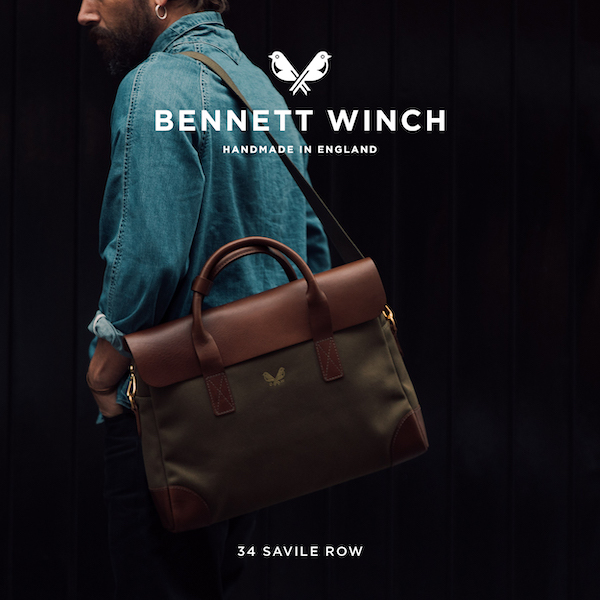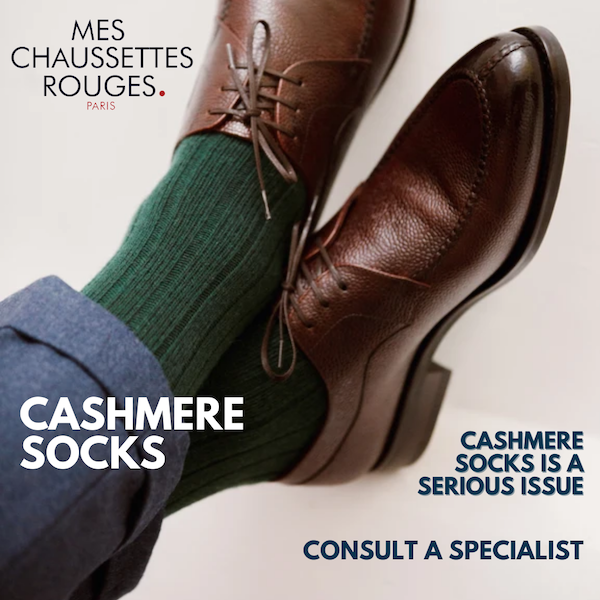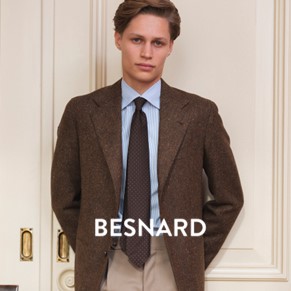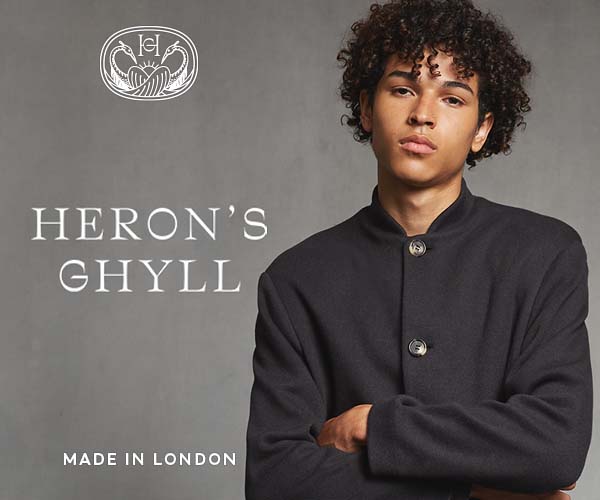The dark shirt
Wearing a dark shirt with a tie is an easy style to get wrong, I think.
It used to be quite widespread in the 1990s: dark maroon or navy shirts with a strongly coloured tie. It seemed to be worn by a certain kind of salesman.
If done right, though, I find a dark shirt under a suit can be an unusual and attractive combination, particularly in the evening.
The key is perhaps not to add colour in the shirt, but stick to soft, muted fabrics that - as a result - still provide an effective backdrop to the tie.
And not too hard or shiny in the finish too. That helps keep it subdued as well, and in the background.
My favourites are a grey shirt (darker but muted version of white) and denim (darker but muted version of blue).
The denim, too, should not be too strong a colour.
Indeed, I’d go as far as to say that strong-blue denims are harder to wear with tailoring generally - with or without a tie. And yet most shirtmakers offer these primarily, when a softer, weaker colour would complement more colours of jacket.
I’ve shown examples here from two events in the past year or so.
First, from the opening party of our pop-up shop in Fortnum & Mason: Permanent Style Presents No.3.
Here the shirt is a mid-grey linen, worn under my Musella-Dembech navy-cotton suit with a navy tie from Shibumi.
The woven-silk has a repeated white pattern of the Florence fleur-de-lis, or giglio. And there is a white-linen handkerchief in the breast pocket, worn as a simple square.
I like the fact that in this situation, despite the navy suit and silk tie, this is clearly not a corporate look. Rather like denim or chambray, it immediately separates it from office wear.
The fact the suit is cotton helps too of course. But even with a sharp worsted, the grey shirt would have that effect.
The second example is from our Japanese Symposium, in Tokyo earlier this year.
Here I’m in the same navy suit, but with a denim shirt and navy large-knot grenadine from Drake’s. The handkerchief is the same white linen, worn as a square, and there is a touch of decoration in the gold and lapis-lazuli lapel pin.
It’s hard to remember how conscious this was, but I think I felt the denim shirt - with its greater texture and fading - suited a plain tie rather than a patterned one, and chunky, casual grenadine silk rather than a standard woven.
The theme of modern evening wear in general is also relevant here.
I commented in the recent ‘Five casual suits’ post that a sharp suit could become the standard for evening wear in the future. And that much as we would bemoan the loss of black tie, it would be a welcome outlet for wearing the sharpest of bespoke tailoring.
In that situation I think a dark shirt is a useful way to signify that this is evening wear.
Jewellery, such as the lapel pin, is another way to do that. And it’s something you can add when going out in the evening (as well as a handkerchief, perhaps) rather than having to change.
My pin is actually a stud for a dress shirt, but one whose long bar makes it easy and secure in a lapel. It is part of a set sold by Kirby Allison on The Hanger Project, and that I’ve worn for several years.
Unfortunately I rarely get to wear black tie, so the studs are underused - and this is a nice way to re-use them. As well as being a piece of decoration that is both personal and precious.
If you have a navy suit and grey or dark-denim shirt, I suggest trying this in the evening.
And if you don’t have either, I recommend at least commissioning a dark denim one - it works well on its own with a tweed or cashmere jacket and flannels too.
In the portrait of my outfit below - taken for Men’s Ex magazine - I’m wearing the cotton suit with my dark-brown Philippe Atienza shoes. In retrospect, black might have been better. Which is what I wore at the Permanent Style Presents opening party.
The grey shirt was made by D’Avino, the denim by Luca Avitabile.
Photography of the party, Alex Natt; and of the Symposium, Ko Tsuchiya.





































Good morning Simon.Whilst I like to wear a french navy suit during daylight hours I find that under artificial light in the evening it can look almost black which I dislike because it can look rather boring,even corporate. Perhaps, a navy cotton suit might be an improvement after 6pm over my woolen one because it looks so different in drape and texture but I just can’t justify yet having another suit commissioned.
Taste is of course very personal, but I find the idea of denim with a tie and tailoring a bit of a stretch. Grey shirts with a tie and coat just about sneaks in, because it is what I had to wear at school.
Fortunately I left school many years ago.
Good article but needed more closeup photos to demonstrate the point.
Particularly as the DB suit hides most of the shirt.
Also , more illustrations of how ties would work with dark shirts.
The denim shirt with suit is an interesting one . Quite a tricky one I feel to pull off with a suit. I’d certainly keep denim for more informal looks.
P.S. continue to comment … more constructively I hope (wink , wink!)
Thanks Robin – and very good points!
Yes it would have been good to do some close-ups, I’ll try to add some in the future.
You’re right too that denim can be tricky here. I didn’t mention, but I think it’s also relevant, that the denim works better when it’s as dark as the one pictured. That feels smarter.
Simon,
I have tried a tie with a denim shirt on one or two occasion, but alway felt that it was a bit off. Something about the fabrics casual nature doesn’t sit right with a tie, even if it is the most casual of ties. Then again, maybe if it was a much lighter denim, as in the Everyday denim, that would be different.
Very interesting article, and I love the idea of a dark shirt for an outfit you could wear out to dinner. Do you think complexion is a factor in whether it works though? I notice some people (paulluxsartoria being a great example) pull off dark shirts really well, but it never quite looks right on me, and I often end up switching out for a light blue Oxford instead.
That said, I do also wonder if the problem is that my denim shirt is a particularly inky blue (kind of like the colour of brand new indigo jeans) whereas yours looks much more faded and muted. Are these shirts both made with the PS denim? Do I just need to wash mine a lot more? It really hasn’t faded a lot since I had it made a few years ago
I think a darker complexion does work a little better yes, and I know you’re pretty fair. That might be a factor.
None of the shirts shot here are PS denim – one is grey linen, the other is an old Albiate denim. But yes, it’s easier with more muted denims – whereas Everyday Denim looks nicest with greys and creams, as it’s a stronger colour.
I can’t say this is a look I care for. I’ve never seen anyone look good in a dark shirt and jacket, or at least never look as good as they would with a light shirt (no offence). It lacks the contrast of a light shirt, and makes a man look very dark overall, even villainous. You have a very friendly-looking face, so you don’t look sinister with a dark shirt and jacket, but most men would.
The only time I’ve seen a dark shirt look good with a jacket is if the jacket is a very light colour, like cream or very light grey.
Interesting view. Does your D’avino shirts have the sleeve seam offset with the body seam of the shirt? I recently picked a shirt from a new tailor who makes this and wondered if it was common practice
Yes, and yes it’s fairly common practice among high-end shirtmakers
I think in almost every case a light shirt looks better than a dark shirt under a dark jacket, but a dark shirt can add some interesting variety.
I agree that it only works for the evening and guys with dark hair. The casual fabrics you show here almost always work better than untextured fabrics, which if all dark connote the unpleasant personas you mention. If worn with a tie, the shirt should still contrast in shade with the jacket. A more saturated color could work, within limits, if the jacket’s saturation is similarly increased. Even more advanced is an odd trouser/jacket ensemble with multiple complementary colors.
Hi Simon,
Another fun combination involving shirts in that color range (and one which I used to frequently use), was mid blue gray shirts, quite similar to yr denim shirt there, but in a fine poplin or pinpoint Oxford, worn with a silk knit or grenadine Garza grossa or tussah silk but with a small knot, and I had the shirt made up with a semi spread collar with pink mother of pearl buttons for an interesting effect if I felt the desire or need to remove my four in hand. I would wear that with typically a golden rod brown Shetland or Harris Tweed suit or the jacket of such a suit with some olive-grown cavalry twill trousers, and wine or fuchsia or pale pink cashmere socks or silk-cotton lisle blend ones and typically russet walking shoes…I also used to wear a similar tie, shirt, hosiery, and footwear combination with either a darker mid gray DB solid twill sack suit, or with a shaggy flannel vintage RL University Shop 3/2 roll sport suit. Fond memories….
I also recall in the early 2000s wearing a cobalt or bright navy end on end shirt with a gold and black Macclesfield tie of my Grandfather’s, or one of my Father’s Japanese ties, particularly a caramelly chestnut brown silk satin one with pointillism designs discharge printed with white on the brown. I believe there may have been a coy fish and pond motif, though very abstracted…..
My “wild” years, or so I’ve been told. I dress much more soberly now, though I think that my suits have become more colorful.
I enjoyed this quite a bit Simon. Thanks for sharing, and for tolerating my rants on my own wardrobe…..
Robin makes an accurate point about illustration but, in a sense, the article only goes halfway (as in grey). For evening wear, especially, darker colours (blue, dark olive, burgundy, black, dark grey, dark purple) should be used. The reason is muted colours die under low light (common in restaurants, clubs, bars etc.), nor, with a suit, would I use denim, stronger bolder colours are required. Matching with a tie is more of a challenge. The answer is not to use overly bold or bright but to pair back to complimentary, muted shades. To recall ‘nineties salesmen’ is a bit sniffy, a check of the 2020 Spring designers (Vogue) shows that darker colours can be used, but with a twist. Armani uses darker shades sans tie, Cucinelli uses dark patterns or checks, Canali uses darker colours with texture. Of interest is the almost complete absence of neck ties: replacing them are slim neck scarves and 70’s style cravats. Fall 2019 sees Armani with a black shirt, dark grey tie, or dark blue shirt, with black tie. However, respectfully, of much greater importance is the complete move away from the silhouettes of the last decade (Hedi Slimane inspired slim cut silhouette with short jackets etc.) to looser, ‘athleisure’ silhouettes in tailoring, casual and high-end fashion wear. This new silhouette features across all fashion brands and current fashion seasons. If you have a slim-cut suit/s its time has passed…bespoke will be slower to change but looser, fuller forms will, undoubtedly, follow.
I am a little bit skeptical to the look. Probably because of all the club doormen and other “cool” people having a black shirt with a suit. Sometimes also with a tie that is lighter than the shirt. But of course it can be good when handled well.
Generally helpful. I typically only wear dark navy shirts informally as an open shirt, without a tie.
Perhaps two things are conflated excessively : colour and informality. Generally the two can be similar, but not entirely. Denim is a very different category than a high quality dark blue poplin.
The lapel pin jewelry thing should be avoided at all costs, in my personal opinion. A fussy look in dubious taste, which provides a curious, and not very happy, distraction. My apologies for bluntness.
I agree that lapel pin jewelry should definitely be avoided. At best it looks dandyish, at worst a bit effeminate.
Maybe with tweed. Otherwise, no.
I really don’t get the idea at all. Happy to wear a denim shirt with a tie, probably knitted rather than anything else, and a cardigan or tweed jacket.
But a denim shirt with tailoring? Not for me thanks.
I have a navy shirt that I wear only in the Autumn/Winter months. I wear it with sport coats in brown shades and grey pants, no tie, and it’s a really nice look. I also have a burgundy and a black shirt ,worn in the colder months only, that I wear with brown or grey sport coats. So dark shirts can work, black being the most challenging, the key being proper contrast. I never wear a tie with a dark shirt to avoid the mafia or limo driver look.
Great post.
I might take slight issue with the notion that the shade of denim shouldn’t be strong – I think this sort of tonal navy-blazer-with-darker-blue-shirt combination can be terrific:
On the other hand, perhaps you don’t think that’s a strong shade of blue at all and it’s just a matter of defining what exactly “strong” is.
That isn’t too strong Ben, no. But also that works because the jacket isn’t too dark and has the stronger blue overcheck. I think it might be a little too strong under a plain dark navy and a tie, perhaps
Simon, if I recall correctly, one of your standard travel outfits is a navy blazer, navy long sleeve polo, and mid grey pants. Couldn’t a navy shirt be a viable substitute for a navy polo in that context?
Yes good point Scott.
The only issue is most navy shirts are stronger in colour and harder in finish than a polo – not by much, but I find it makes a difference
Hi Simon,
I was just thinking a grey shirting fabric would be nice to see in your upcoming project(s). As you have written before, a grey shirt is seldom seen but can prove to be versatile.
Also, looking forward to your white oxford cloth.
Cheers.
Thanks Neil. Nice suggestion though I’ve never seen a lack of grey fabrics – is there something you were looking for that you couldn’t find? Would be interesting to hear
Hi Simon. Over the years I have worn a number of dark shirts with suits and jackets, personally I like them, an antidote to the line of politicians queued up in their white shirts. However in the end they have all suffered from bleaching marks at the cuffs etc. Is it too high a temperature in the wash, an issue of quality or simply the nature of a dark shirt?
Interesting, it’s not something I’ve experienced. Is it patching bleaching, or more just natural-looking fading, as you might get on a vintage shirt for instance?
Hi Simon, I would say it is more around the outside edge of the collar or cuffs. Anyway, just wondered!
I see. In that case it’s not a mistake or error, just a feature of the shirt. Some like it, as they like a lived-in look, others less so.
It’s likely to do with how the piece has been dyed
Hi Simon,
I recently got a lovely olive linen shirt from 100 Hands, and wonder how you might go about pairing it with tailoring or odd trousers.
Hey Luke – is it similar to my shirt here? Some thoughts there on combinations
Hi Simon,
I was just reading that post this morning, funnily enough. My shirt is a bit darker. I’d say if you took it a few shades darker so that it was about as dark as the blue affair in that article, you’d be close.
Ah OK, thanks.
If it’s that dark, I’d imagine it might work well with mid- to light-grey trousers?
Certainly with cream or white. And perhaps with beige or stone too?
Not sure about darker colours like navy, dark brown. The shirt would need to different enough to the trousers.
Thanks, Simon.
It does look great with light grey. I’ll try the other combinations you suggest. It’s such a lovely shirt, but yes, the colour is a little tough to work with.
Would you ever wear or suggest anyone to wear black or navy shirts predominantly for casual wear?
They can both work, but rarely, with a narrow range of other things.
Hi Simon,
It would be great to consider an article on these non-white/blue/chambray shirt options, but for the no-tie jeans/jacket or chino/jacket end of the formality scale.
How to retain interest without veering into trucker or rural/country territory, keeping to these interesting principles of the cold/muted/urban feel.
For example – do you have suggestions on flannel shirts or how to use pattern?
Thanks Eddie, good point.
What is your opinion on navy chambray or navy linen shirt?
As mentioned here, I think it’s nice but not that versatile – eg great with a navy jacket, but not with anywhere near as many as a white or blue
HI Simon! Could you share your opinion on dark forest green shirts?
I personally find it versatile when worn casually with some mid blue denim and without a jacket.
I quite like the colour, yes, see me wearing one here.
However, as with all dark shirts, they are always harder to wear than lighter ones, and more unusual.
Hi Simon! I really love reading your articles. I really would really appreciate if you could help me decide what kind of sports jacket to pair with my burgundy shirt and charcoal pants. I wanted to do a light grey but not sure if the darker burgundy would look okay. I also wanted to do a dark brown. Do you think either of those jackets would work for the fabrics below? Thank you so much!
I have two shirts:
I would think a really dark brown or perhaps a really dark green would work well. But to be honest I don’t have a burgundy shirt so it’s not a combination I’ve tried to do myself
Hi Simon on a dark olive flannel shirt to wear under casual tailoring what colour buttons would you recommend?
Personally I’d stick with white
Simon! What is your opinion on this olive colour linen shirt?
It is not a very dark olive and therefore I was thinking it could be great for summers
Yes, it isn’t dark – fairly rich, so I wouldn’t put it with that many other strong colours, but it’s a nice shade. Not so much of a fan of the tiny buttondown collar, but that is more trendy these days